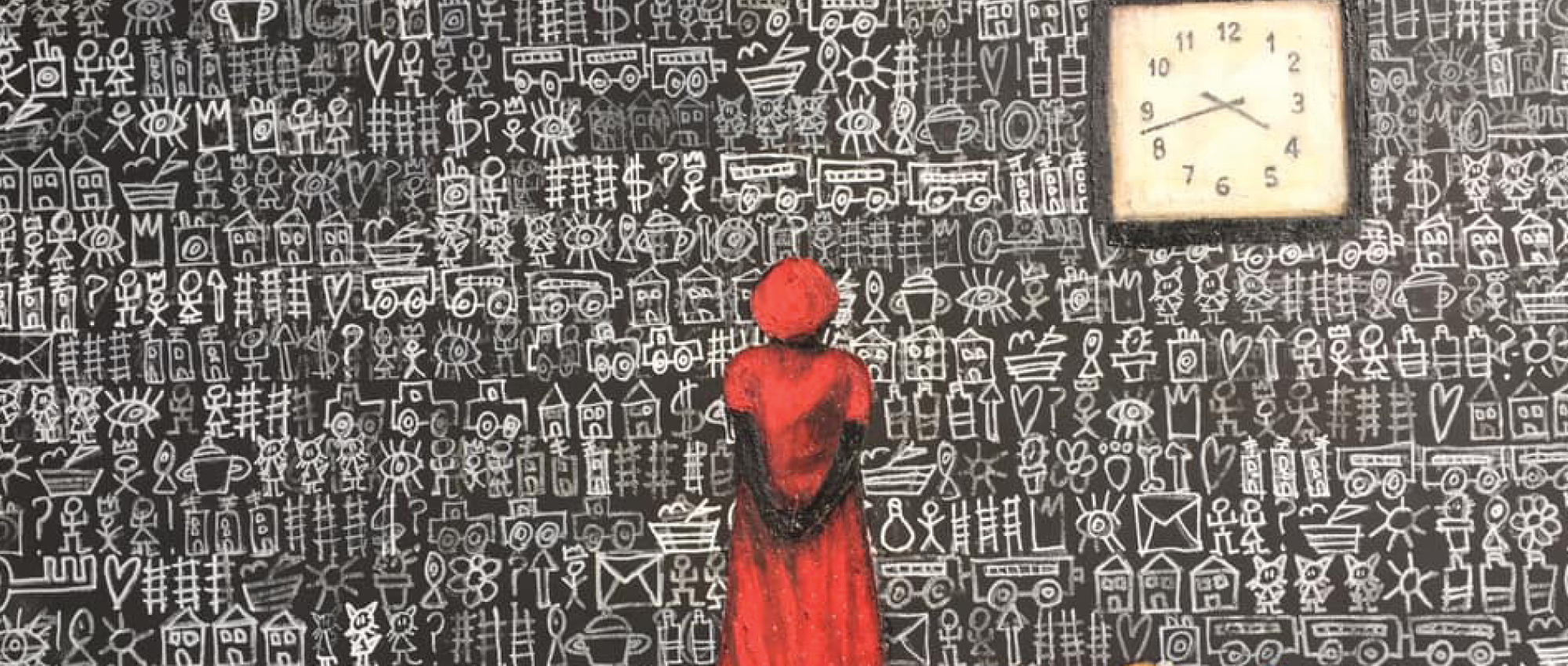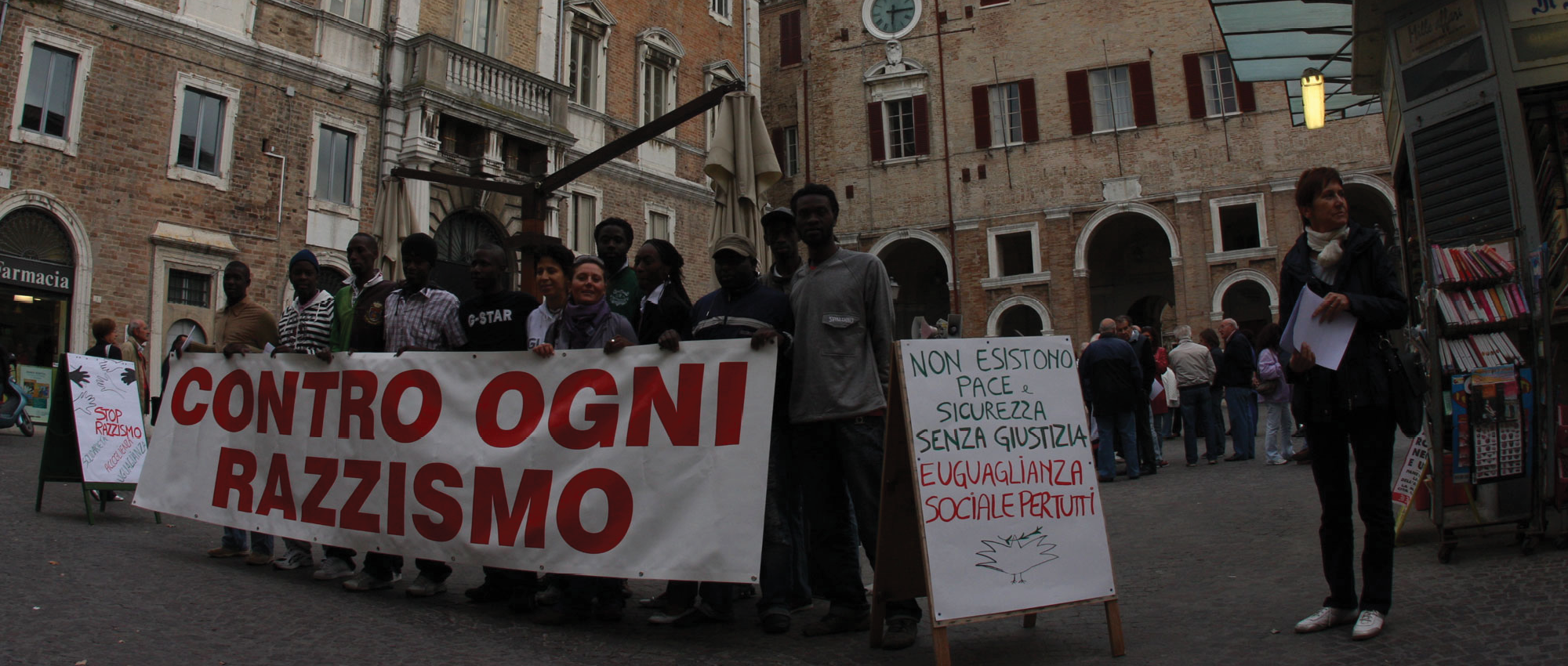Within the contexts of Black Lives Matter and anti-Asian racism, Dr. Gaoheng Zhang, Assistant Professor of Italian Studies, describes the numerous efforts made to diversify and decolonize the field of Italian Studies, including a recent roundtable series that he co-organized in May 2021.


Sospensioni Temporanee (Temporary Suspensions) by Luca Tridente and Gabriella Kuruvilla (2020).
The Roundtables
“The roundtables represented the culmination of our efforts to engage both with recent relevant scholarly initiatives elsewhere and with the larger contexts of Black Lives Matter and anti-Asian racism.”
In May 2021, I co-organized six online roundtables titled “Diversity and Decolonization in Italian Studies,” together with Simone Brioni (Stony Brook University), Marie Orton (Brigham Young University), and Graziella Parati (Dartmouth College), with the assistance of Matthew Greene (University of Wisconsin-Madison). Together, we debated about race and positionality in research, and we suggested ways to diversify and decolonize the curriculum, within the discipline of Italian Studies in Asia, Australia, Europe, and North America.
The roundtable series was an exhilarating experience. It represented the culmination of our efforts to engage both with recent relevant scholarly initiatives elsewhere and with the larger contexts of Black Lives Matter and anti-Asian racism. In total, 29 panelists shared their insights and over 350 participants joined us. In addition to a planned online portal where relevant resources will be posted, a special issue will be published in the journal Italian Studies in Southern Africa/Studi d’Italianistica nell’Africa Australe in 2022.
In what follows, by way of providing a brief reflection on these contexts and activities, I clarify their implications for current Italian Studies research, teaching, and programs. I hope to capture, in broad terms, what my colleagues and I have practiced and envisioned as an ethical, equitable, and sustainable pathway in Italian Studies.
A Quest for Diversity
“How might we imagine a sustainable future of Italian Studies in dialogue with other cultures and disciplines so as to prevent provincialism—a die-hard reality for Italian Studies and Italy?”
Against the background of the ongoing diminution of Italian programs in North America, how can we better engage Asians, Blacks, and Latinos who have become or are becoming a majority of the student populations in Italian courses at most institutions, but who are not represented in the absolute majority of Italian language textbooks (for example, in a module on the names of family members and relatives), parallel to their persistent stereotyping of gender and sexuality?
How might we imagine a sustainable future for Italian Studies as both an independent discipline, which is necessary to justify its existence in the era of downsizing driven by the neoliberal and corporate university, and a discipline open to dialogues with other cultures and disciplines so as to prevent provincialism—a die-hard reality for Italian Studies and for Italy?
How can we create a diversity pipeline for the professoriate and then nurture them, with the knowledge that indifference and even hostility from a select group of powerfully positioned Italian Studies professors have negatively impacted the careers and the wellbeing of some minority students and faculty members?
The first memorable event on the subject was a symposium hosted by the John D. Calandra Italian American Institute at the City University of New York in January 2019, “Diversity in Italian Studies.” I presented a paper in the symposium, which featured Deborah Parker as the keynote speaker—a Vancouver-born, Chinese Canadian professor of Italian at the University of Virginia.
At the symposium, Parker reiterated highlights from her 2018 article for Inside Higher Ed, “Race and Foreign Language,” in which she analyzes data collected from 40 minority graduate students and faculty members in Italian, French, and Spanish (including me), in arguing that “greater diversification offers a way forward”—particularly for a field like Italian Studies. As the resulting edited volume and the recorded lectures show, participants offered a plethora of solutions to address questions that will preoccupy most of subsequent initiatives.


Credit: Andrea Cesanelli
https://web.archive.org/web/20161013060950/http://www.panoramio.com/photo/14259602
Race & Decolonization
“These initiatives argue in favour of seriously broadening the prevailing confines of the discipline, as well as radically reconsidering its hiring, pedagogical, and research practices.”
While the Calandra symposium examined diversity in its many guises, including the need for an integration of Queer Studies in the analysis of Italian culture, a focus on race, decolonization, and diversity was sharpened in events organized after the galvanization of Black Lives Matter in May 2020 and the onset of Covid-19-related anti-Asian racism since early 2020. Seizing the momentum, several groups in Italian Studies and Italy-related associations, which are multi-centred in Canada and in the United States, organized activities to think and act collectively.
For example, I was directly involved with the following events:
In May 2021, I moderated the opening book presentation in Toronto’s Librissimi book festival, featuring Oiza Queensday Obasuyi, an Italian journalist of Nigerian descent, whose book Corpi estranei (Varese: People, 2020) interprets contemporary Italy’s public perceptions of the blacks and race in the lens of the country’s colonial and fascist pasts.
In April 2021, the Italian Studies Antiracist Actions Group at the Department of Italian Studies at the University of California, Berkeley invited me and five other people of colour who are in some way concerned with Italy or Italian Studies (SA Smythe, Angelica Pesarini, Barbara Ofosu-Somuah, April Renée Lynch, and Hiju Kim) to a “A Roundtable Discussion on Disciplinarity and Belonging,” where we shared our thoughts on how to broaden the scope of Italian Studies and to find a sense of being at home in the discipline for non-whites and non-native Italian speakers.
On this occasion, I also shared University of California, Berkeley’s report on “Searching for a Diversity Faculty: Data-Driven Recommendations,” in which the authors offer the following advice with confidence: “conventional search practices are not enough for consistent success in hiring top women and URM [underrepresented minority] faculty” (p. 6).
In January 2021, I offered a general-audience webinar on “Covid-19 and Anti-Chinese Racism in Italy” for Italian-Canadians for Black Lives, a group which aims to “contextualize the Italian diaspora in white supremacy and amplify the Black community in Italian enclaves.”


Mural of Sonia Zhou, a famous Chinese restaurateur in Italy, by Laika. The mural states: There is an epidemic of ignorance going around ... We have to protect ourselves!!!
In August 2020, I received an invitation from Rosetta Giuliani-Caponetto at Auburn University, who is one of the few black scholars with tenured positions in Italian Studies, to contribute to a volume on Somalia, which I will address through the connection among Italy, China, and East Africa.
The year 2020-2021 is indeed the first and only time when I came into dialogue with so many colleagues working on Black Italy.
These are only examples in which I was directly involved recently. Many more events have occurred, which were often fostered and sponsored by research and diversity groups:
In 2021, the Frank Iacobucci Centre for Italian Canadian Studies at the University of Toronto hosts a series of roundtables exploring indigenous/Italian-Canadian connections, honouring the Hon. Frank Iacobucci’s concerns with indigenous relations and police violence.
In 2020, with a focus on Italy, the Cosmopolitan Collective was founded in the United States as a “dynamic constellation of interdisciplinary, transnational, and public intellectuals,” who “have collectively organized to heed the clarion call sounded in the wake of the most recent slate of brutal murders of Black, Indigenous, and People of Color (BIPOC) at the hands of the police state.” Notably, the Collective has organized events featuring scholars of colour who research on Italy, including topics on racialization and colonialism.
The “Diversity, Transformation & Italian Studies” group was formed by a team of American Italianists in 2020 to empower “scholars, educators, artists, and practitioners to promote diversity and transform Italian Studies by rejuvenating pedagogy, curriculum, and research.”
In the same year, Serena Bassi (Yale University) and Giulia Riccò (University of Michigan) set up a “Transnational Italian Studies Working Group” with the goal to further encourage teaching and researching Italy from the perspectives of “empire, diaspora, migration, travel, translation, multilingualism, colonial history, postcolonial culture and critical tourism studies.”
Around the same time, Simone Brioni (Stony Brook University), Francesco Ricatti (Monash University), Barbara Spadaro (University of Liverpool), and I became the new co-editors of H-ItalianDiaspora, a member of the H-Net Humanities & Social Sciences OnLine, with a plan to revamp the webpage to become a focal point for transnational, transcultural, and mobility studies of Italy.
Together, these and other initiatives present a call to action to the community of Italian Studies scholars and instructors, arguing in favour of seriously broadening the prevailing confines of the discipline, as well as radically reconsidering its hiring, pedagogical, and research practices.
Thanks to this civic engagement in the discipline, even the field’s largest professional organization, American Association for Italian Studies, has commissioned a report on diversity, equity, and inclusion based on a well-responded survey among its members, which the president will share and invite feedback during two townhalls held on May 29 and June 4, 2021 during the annual conference.
Past Efforts to Diversify & Decolonize
Some may argue that such innovative practices have always been present within the study of Italy.
One may reflect on the experience of the Italian American Studies since the 1960s, which was consolidated by the Italian American Studies Association, and which has engendered book series at Palgrave, Springer, Fordham University Press, and SUNY Press.
One may also refer to the 1990s re-reading and translations of Italian Renaissance women’s writings as an example, evidenced by “The Other Voice in Early Modern Europe” book series published by the University of Chicago Press.
These two examples illustrate Italian-related academic efforts to address gender inequality, bias towards certain sexualities, white supremacy, and white fragility. However, although proponents from both sub-fields have spoken at the Calandra symposium in favour of further diversifying the study of Italy, as a whole, these sub-fields arguably cared little about being accepted by mainstream Italian Studies: the former is anchored to Ethnic Studies and the latter belongs to Renaissance Studies.
A more explicit desire to probe Italy’s global influence, which emerged from Italian Studies scholars in several English and Scottish institutions, was the “Transnationalizing Modern Languages” project completed in the 2010s. The project examined how Italian culture was and is networked worldwide through migration, mobility, and translation, and it used this case study to investigate “practices of linguistic and cultural interchange within communities and individuals.”
The two conferences on Italy and East Asia that I co-organized at the University of Toronto (2016) and at Stony Brook University (2018) represented a different practice of transnationalizing Italian Studies, that of putting it into dialogue with other cultures to explore the contact zones, a method which does not necessarily privilege the vantage point of Italian Studies. However, neither race nor decolonization was these projects’ explicit main concern, as they are for the recent efforts to reconsider Italian Studies pedagogy and research.
Finally, an impressive range of scholarly articles and monographs have been published since the 2000s that investigate the abovementioned subjects in Italian culture. But the majority of them are the products of individual efforts in dialogue with their preferred colleagues. The current set of activities, of which I have given examples, is often collectively organized by collaborative teams in addressing the lack of diversity in a comprehensive range of areas in the field of Italian Studies:
- from research to teaching;
- from hiring to the pipeline;
- from senior to junior scholars;
- from tenured and tenure-track faculty to contingent faculty;
- from native speakers to non-native speakers of Italian;
- from language instructors to literature and cinema professors;
- from Asia, Australia, and Europe to North America;
- from medieval and Renaissance studies to the study of modern and contemporary Italy.
The concrete societal changes brought forth by the “Me Too” movement and by the protests against Donald J. Trump’s office in the White House must have nurtured and encouraged these Italianists’ activism in transforming Italian Studies.
The roundtable series that I co-organized was also partially inspired by both the “Diversity, Decolonization, and the German Curriculum” and the “Diversity, Decolonization, and the French Curriculum,” with some co-founders or members of the steering committees fortuitously based in Vancouver, like me.
Further Exploration


Dr. Gaoheng Zhang, Assistant Professor of Italian Studies
“Are we witnessing a decisive turn in Italian Studies to a race/gender-conscious, diversity-embracing, transnational, transcultural, cosmopolitan, and decolonizing way of co-producing and sharing knowledge about Italy?”
Therefore:
- Are we witnessing a decisive turn in Italian Studies to a race/gender-conscious, diversity-embracing, transnational, transcultural, cosmopolitan, and decolonizing way of co-producing and sharing knowledge about Italy?
- Given my foregoing remarks, might the FHIS faculty consider strengthening the Italian Studies minor, and reopening the Italian Studies major, with an explicit Transnational/Transcultural focus?
The second question is worthy of consideration particularly at a time when the University of California, Los Angeles has forged a new Department of European Languages and Transcultural Studies, in which Italian is housed; the University of California, Santa Barbara has hired a new faculty member with the title of “Assistant Professor of Transnational Italian Studies”; and in the fall of 2021, the University of Toronto will welcome a new faculty member with dual appointments in Italian Studies and in Diaspora & Transnational Studies.
If we were to follow the hint left by Luca Tridente and Gabriella Kuruvilla in their artwork, Sospensioni Temporanee (Temporary Suspensions, 2020)—the first image in this article, which was used in the poster for the “Diversity and Decolonization in Italian Studies” roundtables—we would temporarily suspend our urge to simply move forward. Instead, we would reflect, wait, and imagine what the future holds for us.


